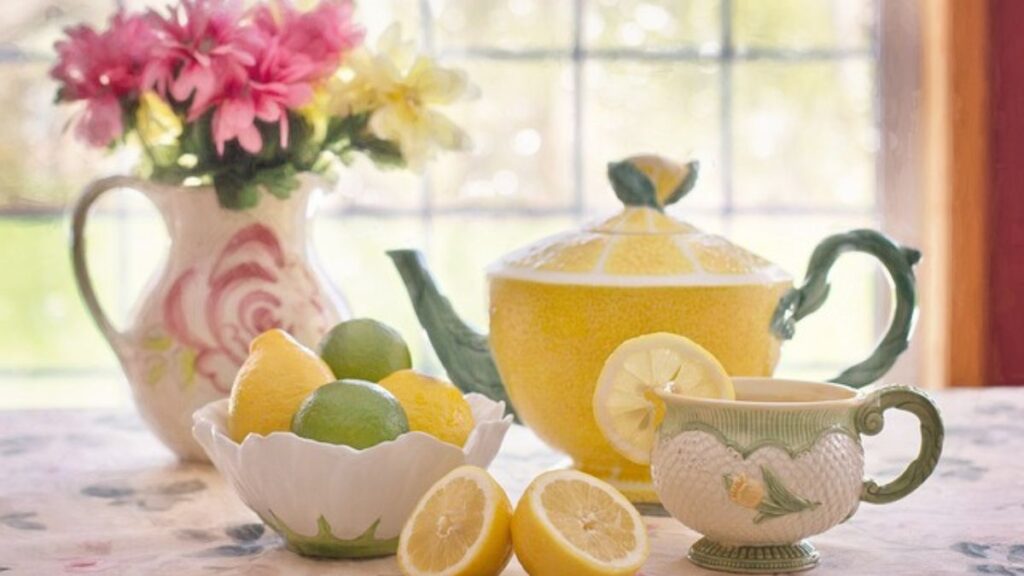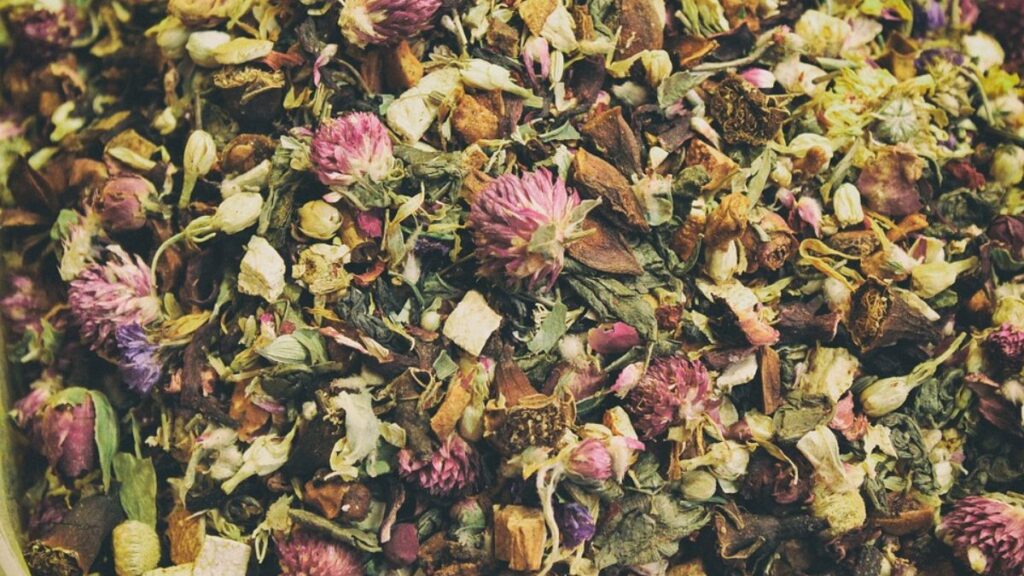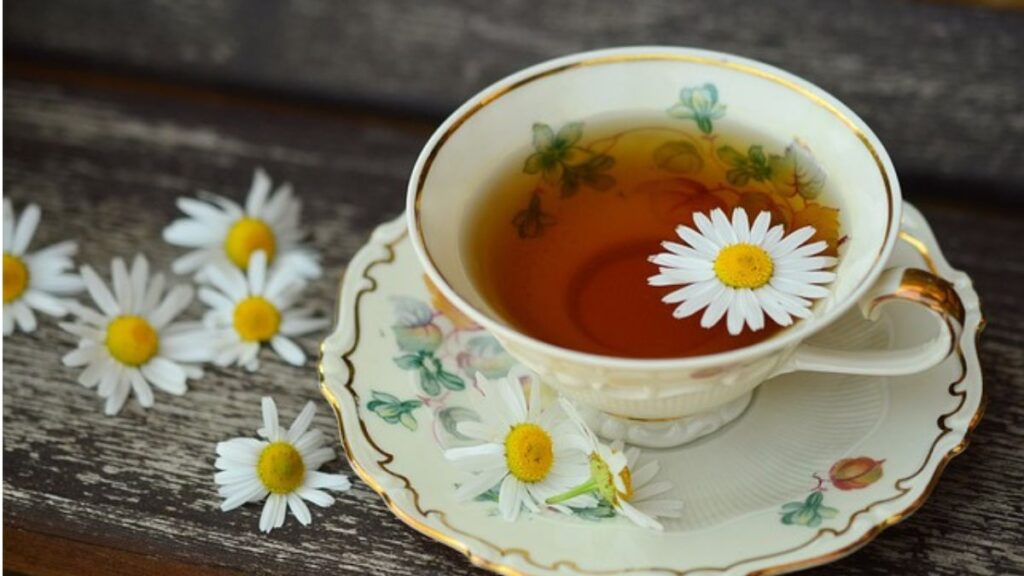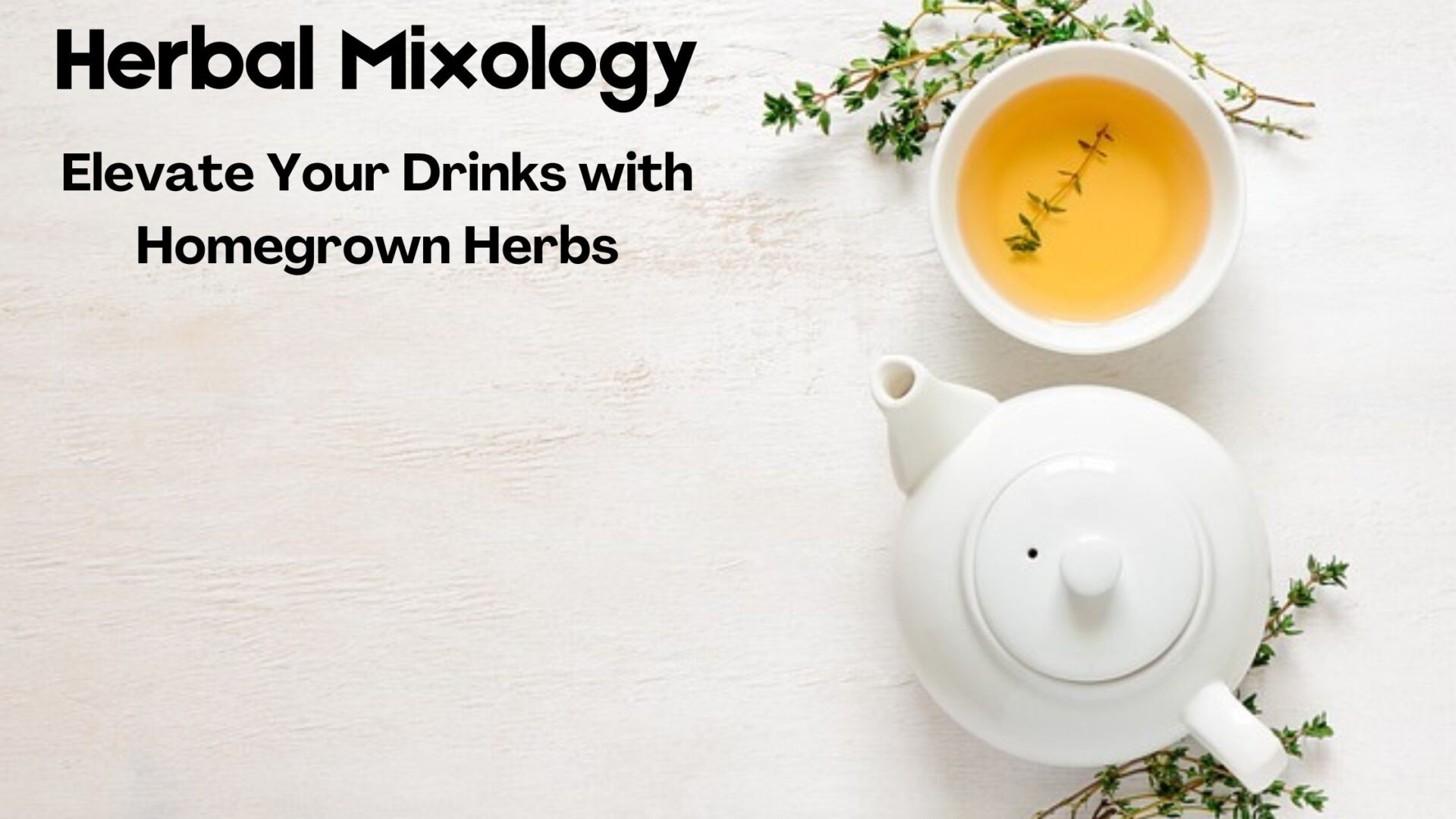Introduction:-
Herbal Mixology: Elevate Your Drinks with Homegrown Herbs

In the realm of horticulture, herb gardening commonly evokes associations with culinary pursuits—dishes imbued with flavorful accents, aromatic seasonings, and vibrant garnishes that enhance the dining experience. However, the scope of herb gardening extends beyond merely complementing meals; it possesses the potential to revolutionize the world of beverages. Enter the realm of herbal mixology, where garden-fresh herbs emerge as protagonists in cocktails and mocktails, offering a symphony of fresh flavors and aromatic nuances that elevate libations to unprecedented heights.
The Art of Herbal Mixology
In the realm of mixology, where creativity and innovation thrive, herbal mixology stands as a unique art form. It involves the harmonious blending of fresh herbs with spirits and mixers, resulting in distinctive and flavorful drinks. Whether you’re a seasoned bartender or a passionate home enthusiast, incorporating herbs from your garden into your beverages can elevate your drink-making repertoire to new heights. The process is accessible and transformative, allowing you to experiment with diverse combinations and uncover your personal favorites. Embark on this enchanting journey of herbal mixology, where every sip holds the promise of an exquisite and refreshing experience.
Why Use Homegrown Herbs?
Growing your own herbs for mixology offers several compelling advantages. Here are the benefits:
1. Superior Freshness:
Homegrown herbs harvested at their prime deliver vibrant flavors and aromas in your drinks. Fresh herbs retain essential oils, ensuring their potency.
2. Enhanced Flavor Profiles:
Control over growing conditions allows you to avoid pesticides, resulting in cleaner, purer flavors free from chemical residues.
3. Greater Variety:
Experiment with a wider range of herbs, including unique and exotic varieties, to add distinctive flavors to your cocktails and mocktails.
4. Cost Efficiency:
Growing your own herbs is a cost-effective solution that provides a continuous supply of fresh ingredients without recurring expenses.
5. Sustainability:
Home gardening reduces carbon footprint by eliminating transportation, cuts down on plastic packaging, and supports biodiversity.
6. Therapeutic Benefits:
Gardening offers physical exercise, stress relief, and a sense of accomplishment, making it a rewarding and therapeutic activity.
7. Educational Experience:
Growing herbs provides an opportunity to learn about plant species, their growth requirements, and culinary uses, deepening your appreciation for mixology ingredients.
8. Convenience:
Having a ready supply of fresh herbs at your fingertips encourages more frequent use, leading to more creative and flavorful beverages.
Essential Herbs for Your Mixology Garden

At-home mixologists can enjoy a garden filled with herbs that bring fresh and aromatic flavors to their cocktails and mocktails. Here are ten essential herbs to consider growing:
1. Mint (Mentha)
- Types: Spearmint, peppermint, chocolate mint
- Uses: Versatile, used in a wide range of cocktails, refreshing flavor, and cooling sensation
- Growing Tips: Prefers partial shade and moist, well-drained soil, easy to grow but can become invasive, best planted in a container to control spread
2. Basil (Ocimum basilicum)
- Types: Sweet basil, Thai basil, lemon basil
- Uses: Adds a sweet, peppery flavor with hints of anise and clove, used in cocktails and lemonade recipes
- Growing Tips: Thrives in warm weather and requires full sun and well-drained soil, regular pruning encourages bushier growth and prevents early flowering
3. Rosemary (Rosmarinus officinalis)
- Uses: Pine-like aroma and flavor complement gin and vodka-based drinks
- Growing Tips: Prefers full sun and well-drained soil, can be grown in containers or directly in the ground, regular pruning maintains shape and encourages growth
4. Thyme (Thymus vulgaris)
- Uses: Subtle earthy flavor works well with a variety of spirits, great addition to gin and vodka cocktails
- Growing Tips: Prefers full sun and well-drained soil, drought-tolerant once established, needs minimal care, regular harvesting encourages new growth
5. Lavender (Lavandula)
- Uses: Floral notes add a unique twist to cocktails and mocktails, used in martinis, lemonades, and infused syrups
- Growing Tips: Requires full sun and well-drained soil, thrives in drier conditions, prune back after flowering to maintain shape and promote new growth
6. Lemon Balm (Melissa officinalis)
- Uses: Light, lemony flavor brightens up drinks, used in mojitos and iced tea
- Growing Tips: Prefers partial shade to full sun and moist, well-drained soil, can spread quickly, so container growing is advisable for growth control
7. Sage (Salvia officinalis)
- Uses: Savory, slightly peppery flavor pairs well with bourbon and gin, used in cocktails and infused gin and tonics
- Growing Tips: Prefers full sun and well-drained soil, hardy plant that requires minimal care once established, regular pruning keeps it bushy and healthy
8. Cilantro (Coriandrum sativum)
- Uses: Fresh, citrusy flavor perfect for margaritas and infused gin cocktails
- Growing Tips: Prefers cool weather and partial shade, can be difficult to grow in hot climates as it bolts quickly, regular harvesting of leaves can prolong its growing season
9. Lemon Verbena (Aloysia citrodora)
- Uses: Strong lemon scent and flavor, fantastic addition to teas, lemonades, and vodka or gin-based cocktails
- Growing Tips: Needs full sun and well-drained soil, grow in containers and bring indoors during colder months in temperate climates
10. Borage (Borago officinalis)
- Uses: Cucumber-like flavor, flowers make a beautiful garnish, used in Pimm’s Cup and lemonade
- Growing Tips: Prefers full sun and well-drained soil, self-seeding annual plant, ensuring a continuous supply of fresh borage.
Crafting Herbal Cocktails and Mocktails

The Classic Mojito:
Ingredients:
- Fresh mint leaves
- 1 ounce lime juice
- 2 teaspoons of sugar
- 2 ounces of white rum (or omit for a mocktail)
- Soda water
- Ice
Instructions:
- In a glass, muddle the mint leaves, lime juice, and sugar.
- Fill the glass with ice.
- Add the rum or omit it for a mocktail.
- Top it off with soda water and stir gently.
- Garnish with a sprig of mint and a lime wedge.
Basil Gimlet
Ingredients:
- Fresh basil leaves
- 2 oz gin (or omit for a mocktail)
- 1 oz lime juice
- ¾ oz simple syrup
- Ice
Instructions:
- Muddle the basil leaves with lime juice and simple syrup in a shaker.
- Add gin (or omit for a mocktail) and ice.
- Shake well and strain into a chilled glass.
- Garnish with a basil leaf.
Rosemary Lemonade
Ingredients:
- Fresh rosemary sprigs
- 1 oz lemon juice
- 1 oz simple syrup
- 2 oz vodka (or omit for a mocktail)
- Soda water
- Ice
Instructions:
- Muddle the rosemary with lemon juice and simple syrup in a glass.
- Fill the glass with ice.
- Add vodka (or skip for a mocktail).
- Top with soda water and stir gently.
- Garnish with a rosemary sprig and a lemon slice.
Tips for Success
- Experiment: Don’t be afraid to try different herb combinations and find what you enjoy the most.
- Infuse: Create herb-infused syrups or spirits for a more intense flavor.
- Balance: Ensure a balance of flavors by pairing strong herbs with milder ingredients.
- Presentation: Garnish your drinks with whole herb sprigs or leaves for a visually appealing touch.
Conclusion
Herbal mixology elevates home bartending by incorporating fresh, homegrown herbs into cocktails and mocktails. Explore its endless possibilities for delicious, aromatic drinks that impress guest.
FAQs on Herbal Mixology
1. What is herbal mixology?
Herbal mixology is the practice of using fresh herbs, often homegrown, to create flavorful and aromatic cocktails and mocktails. It involves blending the natural essences of herbs with spirits, mixers, and other ingredients to craft unique drinks.
2. Can I use dried herbs in herbal mixology?
While fresh herbs are generally preferred for their vibrant flavors and aromas, dried herbs can be used in a pinch. However, they should be used sparingly as their flavors are more concentrated, and they may not provide the same fresh, aromatic qualities as fresh herbs.
3. What are some easy-to-grow herbs for beginners?
Some beginner-friendly herbs that are great for mixology include mint, basil, rosemary, thyme, and lemon balm. These herbs are relatively easy to grow and can thrive in a variety of environments.
4. How do I store fresh herbs for mixology?
Fresh herbs can be stored in the refrigerator by placing the stems in a glass of water and covering the leaves with a plastic bag. They can also be wrapped in a damp paper towel and placed in a plastic bag. For longer storage, consider freezing herbs in ice cube trays with water or oil.
5. What are some basic tools needed for herbal mixology?
Basic tools for herbal mixology include a muddler (for crushing herbs to release their flavors), a shaker, a strainer, a jigger (for measuring), and a variety of glassware. A sharp knife and a cutting board are also essential for preparing herbs.
References
Books
- “The Drunken Botanist: The Plants That Create the World’s Great Drinks” by Amy Stewart
- This book explores the botanical origins of various alcoholic beverages and includes recipes and tips for incorporating herbs into your drinks.
- “Herbs for Cocktails” by Chris McMillian and Julia Reed
- A comprehensive guide to using herbs in cocktails, with recipes and gardening tips.
Articles
- “Fresh Herbs in Cocktails: Tips and Recipes” – Liquor.com
- This article provides tips on using fresh herbs in cocktails and includes several recipes.
- “The Best Herbs for Cocktails” – Bon Appétit
- An overview of the best herbs to use in cocktails and how to incorporate them effectively.








